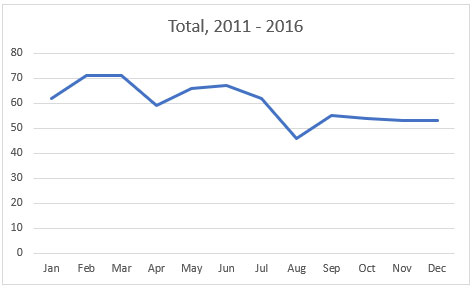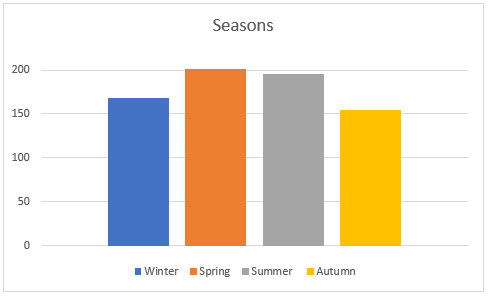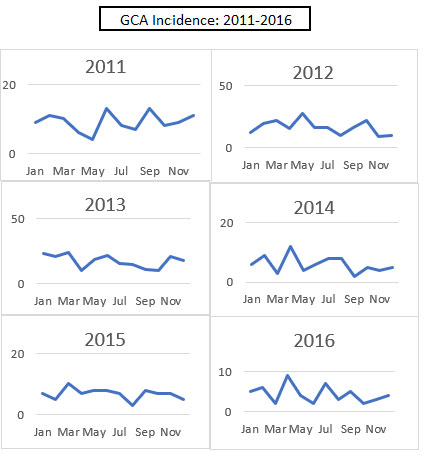Session Information
Date: Saturday, November 12, 2022
Title: Vasculitis – Non-ANCA-Associated and Related Disorders Poster I: Giant Cell Arteritis
Session Type: Poster Session A
Session Time: 1:00PM-3:00PM
Background/Purpose: Giant Cell Arteritis (GCA) is the most common primary systemic vasculitis in adults, occurring in individuals over age 50, most frequently in women (3:1, F:M) and in those of Northern European descent. While genetic factors contribute to the increased incidence in Northern Europe, environmental triggers are likely to also play a role. Seasonal and cyclical fluctuations in incidence have been demonstrated in some cohorts. Environmental triggers may play a role in inducing vascular inflammation and also may contribute to the differing patterns of disease seen in GCA.
The objective of our study was to investigate the seasonal variation in the incidence of GCA in one geographical region – the United Kingdon and Ireland. To do this, we used three GCA datasets: from the TABUL study, DCVAS and from St Vincent’s University Hospital (SVUH). The TABUL study (Temporal Artery Biopsy vs Ultrasound in Diagnosis of GCA), a prospective multicentre study, recruited newly suspected GCA patients from sites in Europe. The DCVAS (Diagnostic and Classification Criteria in Vasculitis), a multinational observational study aiming to develop diagnostic criteria in vasculitis, recruited patients from 136 sites in 32 countries, 1220 patients had a diagnosis of GCA. The St Vincent’s University Hospital GCA registry has prospectively recruited patients with GCA from 3 hospital sites in Dublin.
Methods: Using data from the three GCA datasets, we looked at month and year of onset of GCA symptoms or diagnosis date, dependant on available data. For each of the datasets, cases from the UK and Ireland were included from years where complete data was available (2011-2016 for DCVAS, 2011-2013 for TABUL and 2012-2016 for SVUH). Patients who were included in more than one of these datasets were identified and duplicates were removed.
Results: We included a total of 719 GCA patients, from the UK and Ireland, in this study: 202 from the SVUH registry (2012-2016), 201 from the TABUL dataset (2011-2013, excluding SVUH duplicates) and 316 from DC-VAS dataset (2011-2016, excluding duplicates from the SVUH and TABUL databases).
Overall, we found a higher incidence of GCA during the spring and early summer compared to the autumn and winter.
Similarly, when analysed individually, each year had a peak in GCA incidence during the spring/early summer with most years having a 2nd peak in the Autumn or Winter.
Conclusion: Analysis of these GCA datasets suggests there is a peak in incidence of GCA in the spring/early summer. This further supports the role of environmental triggers in the pathogenesis of GCA.
Acknowledgements:
TABUL and DCVAS investigators.
To cite this abstract in AMA style:
Rooney L, O'Neill L, Molloy E. Seasonal Variation in the Incidence of GCA in the UK and Ireland [abstract]. Arthritis Rheumatol. 2022; 74 (suppl 9). https://acrabstracts.org/abstract/seasonal-variation-in-the-incidence-of-gca-in-the-uk-and-ireland/. Accessed .« Back to ACR Convergence 2022
ACR Meeting Abstracts - https://acrabstracts.org/abstract/seasonal-variation-in-the-incidence-of-gca-in-the-uk-and-ireland/



